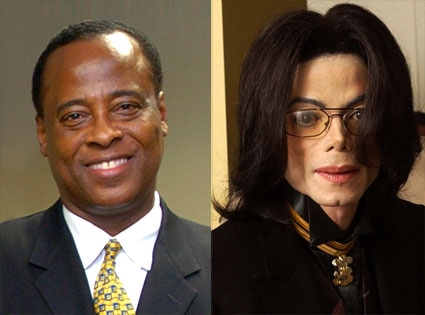 AP Photo/Houston Chronicle, Pool Photographer
AP Photo/Houston Chronicle, Pool PhotographerConrad Murray was never going to emerge from the preliminary hearings in his involuntary manslaughter case smelling particularly of roses. Then again, neither was Michael Jackson.
But that didn't stop both sides from going tit-for-tat with shocking allegations in the first four days of Murray's no doubt lengthy hearing, which will determine whether or not there is enough evidence for the not-so-good doctor to stand trial on the charge.
And while we thought we'd heard everything there was to hear about the days prior to Jackson's death, this week's court sessions—which were attended by Katherine, Joe, Randy, Jackie, LaToya, Rebbie and Janet Jackson—brought forth several revelations that even we didn't see coming. Here are the five biggest…
1. The children saw everything. It emerged during testimony this week that Michael's two oldest children, Prince and Paris, watched as Murray frantically attempted to revive the pop star in his bedroom. Head of Security Faheem Muhammad told the court that the children were came to the room and watched from the doorway as Murray performed chest compressions on the open-mouthed, open-eyed Jackson. At one point, according to Muhammad, Paris was "on the ground on her hands and knees and she was crying." Eventually, common sense prevailed and someone stepped in to escort the traumatized children from the room.
2. Murray had never performed CPR before. During the frantic ensuing efforts to revive Jackson, according to the testimony by Muhammad, the doctor was "in a panicked state asking, 'Does anyone know CPR?'"
"I looked at [the bodyguard] because we knew Dr. Murray was a heart surgeon, so we were shocked," Muhammad said, adding that after Murray began to breath into Jackson's mouth, he paused to tell the men, "you know, this is the first time that I give mouth-to-mouth, but I have to do it because he's my friend."
3. Murray allegedly tried to cover his tracks. The timeline of Jackson's death has been well-trodden, but it emerged in court this week that when it became clear there was a problem, Murray waited a full 21 minutes before calling 911, at which time he failed to tell paramedics that he had administered propofol. During that time, instead, in addition to attempting to revive Michael, he phoned Jackson's personal assistant and sent off several text messages.
Former P.A. Michael Amir Williams testified that Murray asked him to leave the hospital and return to Jackson's home in order to remove "some cream that he wouldn't want the world to know about." Williams also said that Murray asked him to hide evidence Jackson had taken sedatives, and asked another security guard, Alberto Alvarez, to assist in removing pill bottles and medical paraphernalia from the room (Alvarez testified to the same behavior). Williams refused to leave the hospital to help Murray, and in fact told the doctor that police had confiscated his keys to get out of the situation. However, he was suspicious enough that he phoned the security at the Jackson house and asked that they not let Murray back into the building.
4. Murray wanted to go for the jugular. Literally. Paramedic Richard Senneff took the stand this week to discuss the hectic ambulance ride which transported Jackson, whom Senneff said was wearing pajamas and a shower cap and looked "like a hospice patient," to the hospital. Senneff testified that Murray was "sweating," "spinning," "hyperkinetic," and "multitasking at a high rate of speed" while he was in the home, and reiterated that the doctor failed to disclose any of the medications he had put Jackson on. He also said he had a "gut feeling" that Murray wasn't telling the truth, and that when he went to pick Jackson up off the floor—where Murray had been conducting chest compressions—his body was already cold to the touch.
En route, it fell to Senneff to hook Jackson up to an IV, though the paramedic was unable to find a workable vein in either arm. Murray asked him to insert a central line—a catheter inserted in the neck or chest—though the paramedic had neither the training nor equipment to do so.
Senneff said that while it was quite clear Jackson was dead, he was uncomfortable calling a time of death on such a high-profile individual and that Murray also urged him against doing so. Instead, Jackson was transported to the hospital, where ER doctors made the call. Dr. Richelle Cooper testified that Jackson was clearly dead as he was being wheeled into the ER, but wasn't yet sure why as Murray's account of the morning already failed to add up.
5. Murray had a curious way of mourning. Everyone mourns differently, but according to Williams' testimony, Murray dealt with the news of Michael Jackson's death pronouncement by announcing he was hungry and subsequently leaving the hospital to get something to eat. According to Williams, he never returned. When deputies later showed up to begin questioning Murray, no one was sure of his whereabouts, so Williams simply handed over Murray's phone number.
The Los Angeles County Coroner ruled Jackson's death a homicide and said that he died on June 25, 2009 from acute propofol intoxication. Prosecutors argue that Murray is at fault for what they've deemed "an extreme deviation from the standard of care."
For his part, Murray has pleaded not guilty to the involuntary manslaughter charge. If convicted, he faces four years in prison.